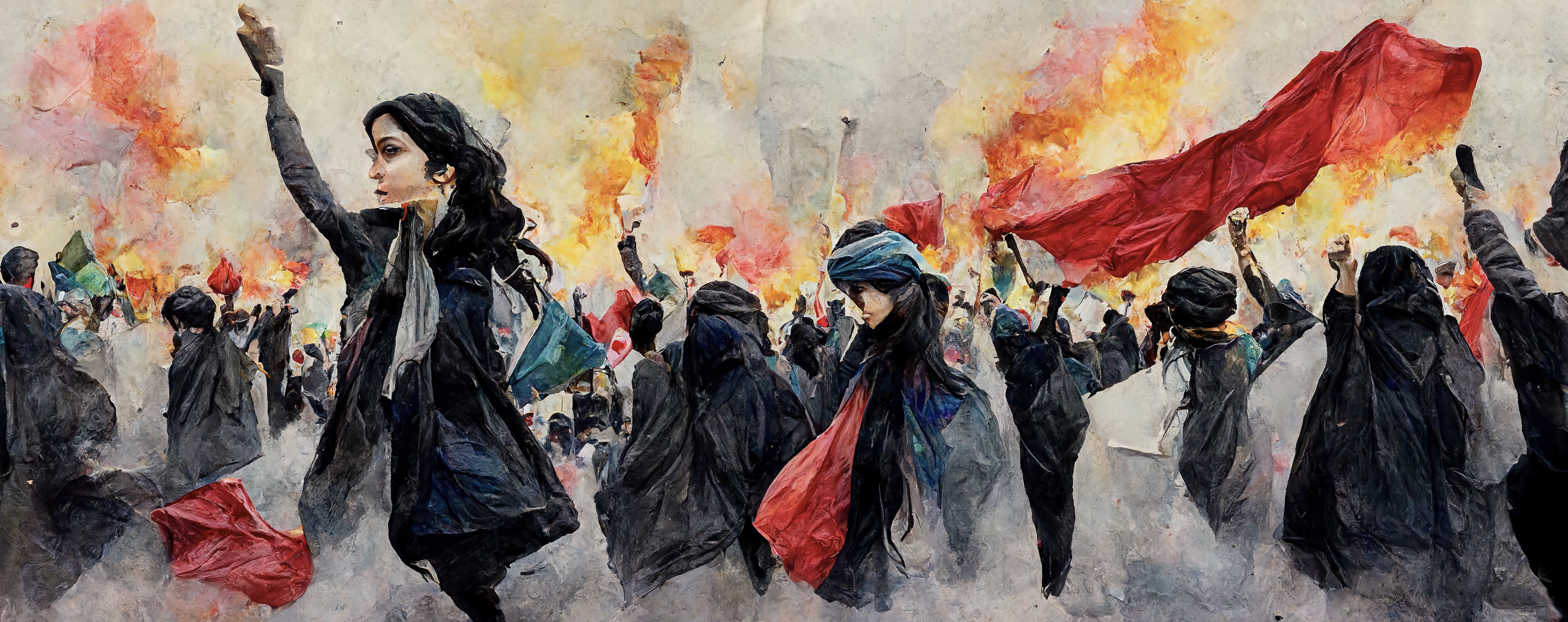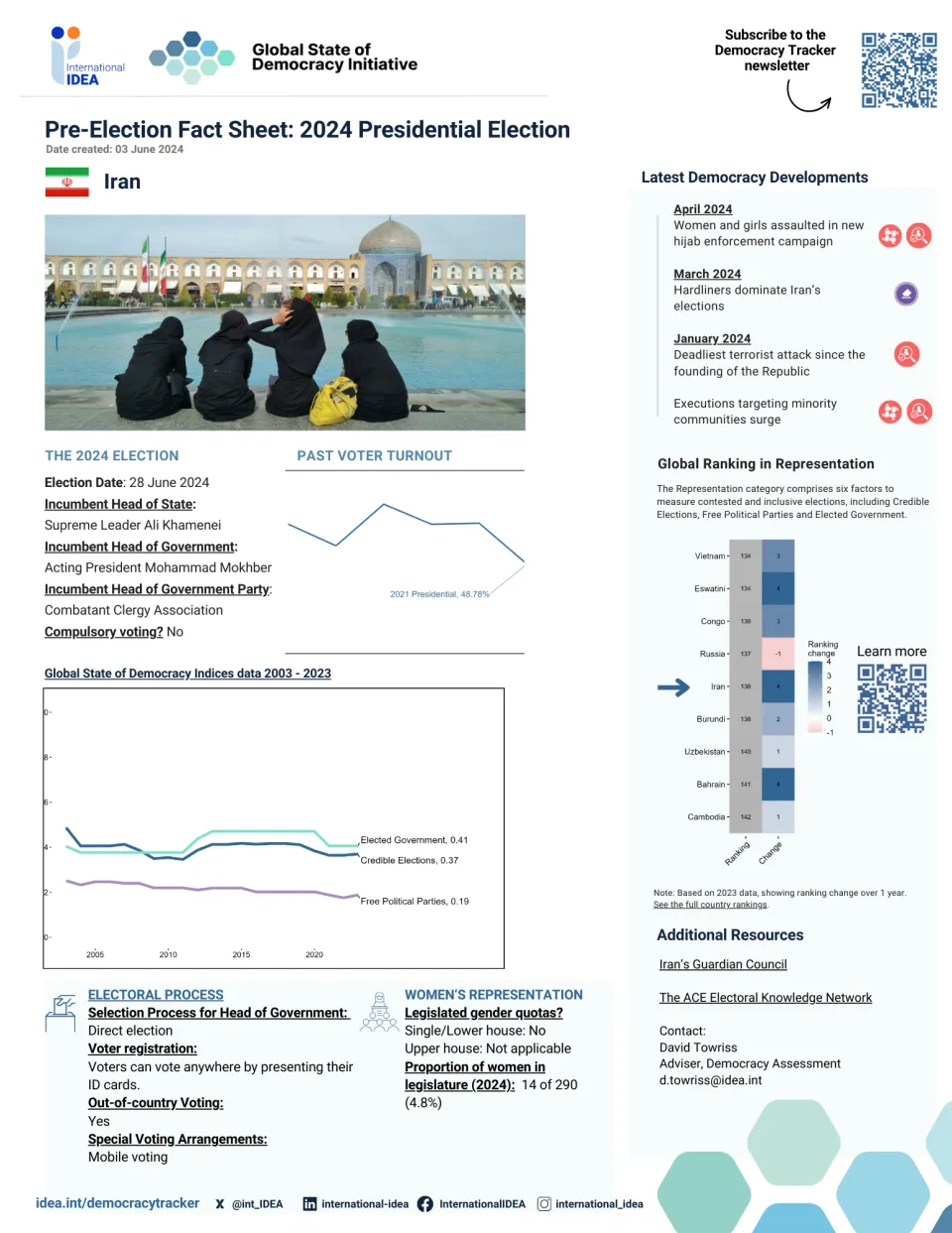
Iran
The Islamic Republic of Iran performs in the low range across all four categories of the Global State of Democracy framework. It ranks among the bottom 25 per cent of countries globally in most factors of democratic performance. Compared to five years prior, its performance has remained stable, although with declines in Elected Government. Economically, Iran is an upper-middle income country and a major oil and natural gas producer, with key hydrocarbon and agriculture sectors, as well as services. Its economy has stagnated due to Western sanctions and oil price volatility.
Iran was never formally colonized but experienced foreign influence from Britain and Russia in the 19th and 20th centuries. The 1906 Constitutional Revolution introduced parliamentary rule and limited royal powers, but a 1953 coup reversed those gains. The coup was backed by the U.S. and U.K., partly due to the regime’s plans to nationalize the oil industry, and it reinstated authoritarian rule under the Shah. Growing opposition to the Shah’s rule culminated in the 1979 Revolution, which replaced the monarchy with an Islamic Republic. Since then, Iran’s political culture has been shaped by ardent debates between tradition-oriented, conservative hardliners and modernist reformers, reflecting divisions over religion, democracy, freedoms, rights, and the country’s role on the global stage.
Iran’s political and social landscape is marked by deepening divisions between a ruling elite committed to preserving the Islamic Republic's ideological foundations and a diverse, modern population increasingly demanding reform. The legal system is based on a monolithic interpretation of Islamic law, centered on the principle of wilayat al-faqih (Guardianship of the Jurist), which vests ultimate authority in the Supreme Leader —a senior cleric who holds the highest political and religious power and to whom all branches of government, including the executive headed by the President, are ultimately subordinate. In 2024, Masoud Pezeshkian became the country’s first reformist President in nearly two decades, yet his plans remain constrained by this system and resistance from conservative power centers.
As a Shia Muslim regional power, Iran is engaged in strategic rivalry with Sunni Muslim leader Saudi Arabia, historically leveraging the Sunni-Shia divide to advance their interests and fuel sectarian violence across the region. Its anti-West stance also shapes domestic discourse, often framing foreign influence concerns in ways that justify repression and curb civil liberties. The urban middle class generally favors liberalization, while less densely populated rural regions tend to be more conservative.
Strict social controls include mandatory hijab laws for women and severe punishments for LGBTQIA+ individuals, including the death penalty. Widespread human rights violations, including internet censorship, torture, and execution, have inspired recurring protests demanding greater freedoms. Religious minorities, particularly the Baha’is, and ethnic minorities (making up roughly 40 per cent of the population) also face repression. Economic challenges—including corruption, state domination of the economy, and high unemployment— fuel ongoing popular discontent and instability.
Looking ahead, Rights and Rule of law will be important areas to watch, particularly in relation to how Iran manages future protests amid a mitigated, though ongoing, legitimacy crisis. Political stability remains uncertain, with Supreme Leader Ali Khamenei’s advanced age raising questions about leadership transition. At the same time, evolving public frustration is reshaping demands for reform, making Representation and Participation key areas to monitor as well.
Last Updated: June 2025
https://www.idea.int/democracytracker/
December 2025
Economic crisis sparks nationwide anti-government protests
On 28 December, a wave of protests erupted across Iran, marking one of the most serious episodes of unrest since the Woman, Life, Freedom protests in 2022-2023. The demonstrations began in Tehran’s Grand Bazaar, where shopkeepers closed their businesses in protest against soaring inflation and the collapse of the national currency. Although initially driven by economic grievances, the protests rapidly started to spread across the country, evolving into broader anti-government demonstrations with the participation of large sectors society, including students, workers and retirees. In the final days of the month, security forces responded using tear gas, beatings and carrying out mass arrests. The protests intensified as they continued into January 2026, with at least 6,000 people killed.
Sources: Associated Press (1), Middle East Eye, The Guardian, Iran International, International IDEA, Associated Press (2)
June 2025
Israeli attacks on Iran kill at least 935 people
Between 13 and 24 June, Israel launched a major air offensive against Iran, killing at least 935 people, including women and children, and injuring thousands of others. The airstrikes, which Israeli authorities claimed aimed to target nuclear facilities, hit critical infrastructure, including seven medical centres, as well as water and energy facilities, causing blackouts and fuel shortages, and limiting access to medical care. A 23 June strike on Evin Prison killed at least 70 people, including inmates, staff and civilians. The attacks caused mass displacement, with hundreds of thousands fleeing cities like Tehran. The United States also launched a strike on a nuclear facility on 22 June. The United Nations condemned these actions as serious violations of international law. A ceasefire between Israel and Iran was reached on 24 June.
*Since the impact of these events are felt primarily in Iran, they are coded in the entries for the latter. While they are not coded for Israel, it is Israeli action that causes the effects on democracy in Iran.
Sources: Associated Press, Arab News, The New Arab, Middle East Eye, United Nations (1), United Nations (2)
April 2025
Missing workers and media crackdown reported after deadly port blast
On 26 April, an explosion took place at the Shahid Rajaei port, the country’s largest commercial port, killing at least 70 people and injuring over 1,000 others. Reports suggest that many unregistered migrant workers from economically marginalized provinces were likely among the victims. These individuals, whose work often goes unrecorded in official employment systems, are especially difficult to identify and reach during recovery efforts. Several workers remain missing. Officials blamed the explosion on negligence, including mislabelling of cargo and unsafe storage of combustible material. Following the incident, journalists reported increased restrictions on coverage, while the Tehran prosecutor’s office filed charges against several media outlets and social media users for allegedly sharing ‘unauthorized information’ about the blast.
Sources: Associated Press, Business and Human Rights Resource Center, Iran International, The Guardian
July 2024
Reformist Masoud Pezeshkian wins snap presidential election

On 5 July, presidential candidate Masoud Pezeshkian, representing the reformist political faction, won the second round of the Iranian presidential election with 53.7 percent of the vote. He defeated his hardline opponent, Saeed Jalili. Voter turnout reached 49.8 percent, higher than the record low 39.93 percent registered in the first round. This snap election was called following the sudden death of former President Ebrahim Raisi in a helicopter crash on 19 May. Initially, 80 candidates, including four women, registered for candidacy. However, Iran’s Guardian Council, responsible for overseeing the elections and vetting candidacies, approved only six male candidates. Two candidates withdrew prior to the first round, leaving four contenders in the race. Since no candidate secured the required 50 per cent of the vote in the first round, a runoff was held between the top two candidates, Pezeshkian and Jalili. Pezeshkian's swearing-in ceremony took place on 30 July.
Sources: BBC, Al Jazeera, IRNA, Mehr News Agency, Al Arabiya
See all event reports for this country
Global ranking per category of democratic performance in 2024
Basic Information
Human Rights Treaties
Performance by category over the last 6 months
Blogs
Election factsheets
Global State of Democracy Indices
Hover over the trend lines to see the exact data points across the years
Factors of Democratic Performance Over Time
Use the slider below to see how democratic performance has changed over time

